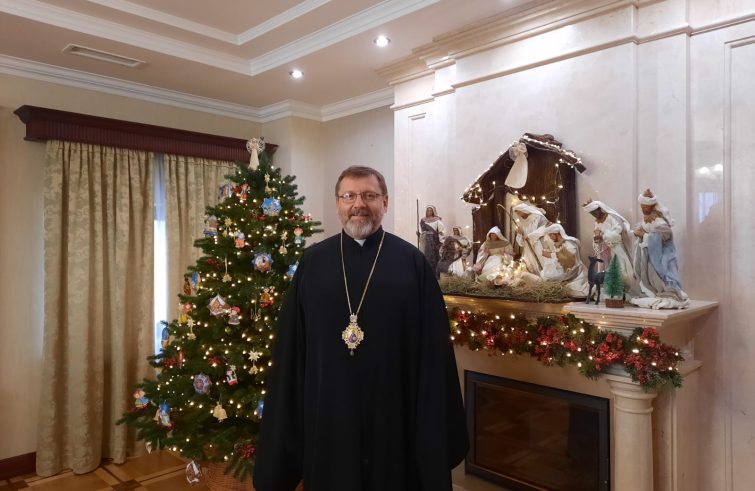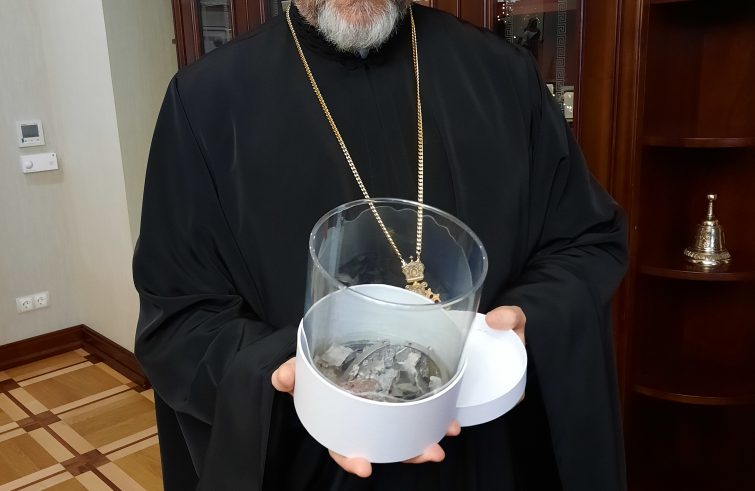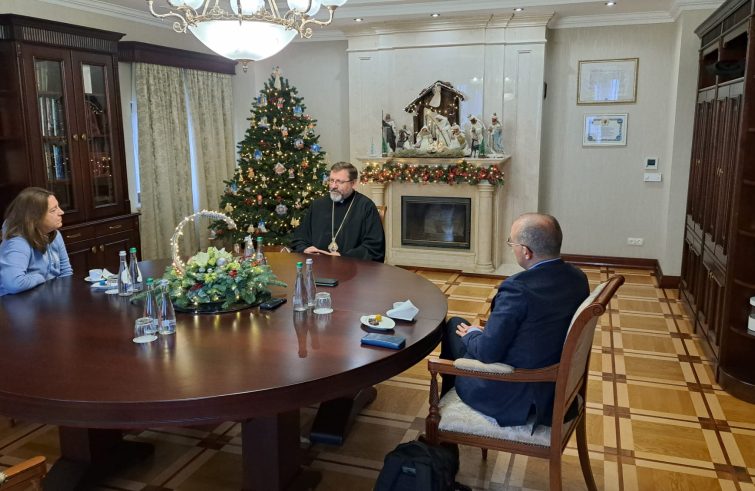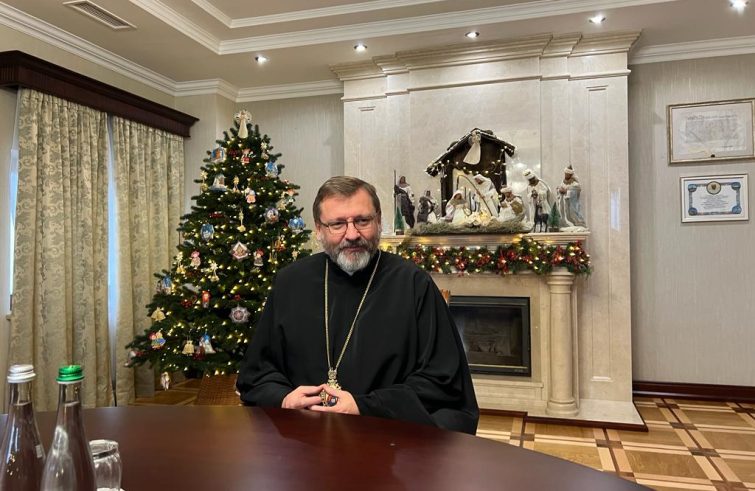
 (from Kyiv) “Many people will celebrate the birth of Christ in air-raid shelters, chanting Christmas carols while the sound of missiles or drones will be heard outside. The Russians intensify their attacks during the most important holidays. But Christmas will be celebrated for sure. And we will celebrate it as a time of consolation.” His Beatitude Sviatoslav Shevchuk, head of the Ukrainian Greek Catholic Church, describes the atmosphere in Ukraine ahead of the Christmas celebrations. He met SIR and ‘Avvenire’ journalists at his residence next to the Resurrection Cathedral in Kyiv. Here too there have been explosions. On 25 November, during an attack, a ‘Shahed’ drone hit the neighbourhood next to the cathedral. The blast damaged the doors and shattered the windows of the building. The marks are still visible, and the archbishop shows us fragments of the drone that he has collected in a jar. “The war is inflicting a serious wound on the Ukrainian people,” he says.
(from Kyiv) “Many people will celebrate the birth of Christ in air-raid shelters, chanting Christmas carols while the sound of missiles or drones will be heard outside. The Russians intensify their attacks during the most important holidays. But Christmas will be celebrated for sure. And we will celebrate it as a time of consolation.” His Beatitude Sviatoslav Shevchuk, head of the Ukrainian Greek Catholic Church, describes the atmosphere in Ukraine ahead of the Christmas celebrations. He met SIR and ‘Avvenire’ journalists at his residence next to the Resurrection Cathedral in Kyiv. Here too there have been explosions. On 25 November, during an attack, a ‘Shahed’ drone hit the neighbourhood next to the cathedral. The blast damaged the doors and shattered the windows of the building. The marks are still visible, and the archbishop shows us fragments of the drone that he has collected in a jar. “The war is inflicting a serious wound on the Ukrainian people,” he says.
“There is no family without a relative who has fallen in battle, or who is anxious and worried about a son or husband who has gone off to fight in the war.
A compelling question is often asked: is it legitimate to rejoice in these circumstances? Is it legitimate to celebrate while others are in tears?”.
Shevchuk tells us that a few days ago, in Chernivtsi, a young father asked him that very question. In his reply, the archbishop referred to the film ‘Life is beautiful’. “In that concentration camp, the father had to make his son smile and be happy: it was a way of protecting him. And here too, in the midst of so much darkness, we need to ignite the light of joy that Christmas brings. It is not a worldly joy that comes from man. It is a joy that comes from God and tells us that we are not alone.” For the first time, instead of celebrating Christmas on 7 January, as is still the case in Russia, Ukraine will join the Western nations in celebrating Christmas on 25 December. This decision was taken jointly by the civil authorities and the ecclesial communities.
 Some people see the ‘new’ Christmas as a move to be distanced from Moscow.
Some people see the ‘new’ Christmas as a move to be distanced from Moscow.
We must keep rediscovering the meaning of Christmas, as Pope Francis tells us, we must free it from marketisation, but in our circumstances we must also rid it of over-politicisation. That is why I call it a Christmas of consolation, because people who are hurting are indeed in need of consolation. And the consoler is God. Furthermore, it is consoling to celebrate it while overcoming our differences, in a multi-religious and multi-ethnic country. “Together at last,” wrote the Council of Christian Churches of Ukraine in a message.
But one church, the Ukrainian Orthodox Church, which is linked to the Moscow Patriarchate and remains committed to the Julian calendar, has chosen not to change.
This Church has long since isolated itself from society. The reform of the calendar has no polemical purpose. This development has not been easy for us either. We left it to the parishes to decide. They all approved, except for one in the Kharkiv region, which asked to be dispensed for this year.
Diplomacy is conspicuously absent from Ukraine’s war. The Holy See is the only exception.
We are very grateful to Pope Francis for the very concrete mission entrusted to Cardinal Matteo Zuppi. This mission does not concern the military aspect, but a series of very important humanitarian issues.
I have in mind, for example, the tragedy of the deportation of children to Russia, an issue that is not on anyone’s mind and yet is so incredibly important. Similarly, in the context of war, environmental concerns are always forgotten: for example, Russia has played the nuclear card, as seen in the events concerning the Zaporizhzhia power plant. I am also thinking of the help given to the people of Ukraine, in the form of aid sent to them or through the appeals to take in our refugees. The Pope’s constant appeals for the martyred Ukraine are an invitation to prayer, but also a reminder not to forget our people. One thing is certain: diplomacy today needs a wake-up call.
 Is Ukraine afraid of being abandoned by the West?
Is Ukraine afraid of being abandoned by the West?
The word Ukraine should be associated with human faces. The faces of children, women, old people. Ukraine is another word for suffering: unjustifiable suffering and innocent victims. So I ask you to see these faces for what they really are and not make them the object of political games, economic games, military games and so on.
The Church remains committed to this cause.
It is estimated that seven million Ukrainians will be food insecure this winter, more than the entire country of Belarus, which has one million fewer people than we do. A whole country is in desperate need of food. Our Church community is trying to cope with this enormous humanitarian crisis, the biggest in Europe since the Second World War. Much aid has arrived in the wake of an emotional wave. Now it is time to reiterate that no one should turn a blind eye. And the Christians of Europe are called to bear prophetic witness.
Some have suggested that the war become a ‘frozen conflict’ or that territorial concessions be made to stop the hostilities.
I will answer as a shepherd. Am I willing to sacrifice millions of Ukrainians who are suffering terribly in the occupied territories for my peace of mind? Should I sacrifice the faithful of our parishes left without priests? Am I willing to sacrifice our two Redemptorist Fathers who have been imprisoned for more than a year and of whom we have no reliable information? I can sacrifice myself for them, but they cannot sacrifice themselves for me. The conflict must not be frozen: it must be resolved. If we were to freeze the war, we would give the enemy the opportunity to reorganise and attack again. In 2024 it will be thirty years since Ukraine handed over thousands of nuclear weapons. It was a prophetic gesture of faith in the power of international law.
It must form the basis of a peace agreement: it must not be subordinated to the law of the strongest or to military offensives. Only then will peace have a solid foundation.
Will the war continue for long?
It is not expected to be a short war. As each of us looks ahead to next year, the question on our minds is: will it be a year of life or death? There is widespread fear. War is a complex phenomenon that can be perpetuated by other means, such as misinformation or economic retaliation. For the conflict to end, there must be a conversion on the part of the aggressor. This may seem humanly impossible, but from a Christian point of view anything is possible. Think of the Soviet Union: who could have imagined the collapse of such a colossus? Instead, it happened. We must never give up.









